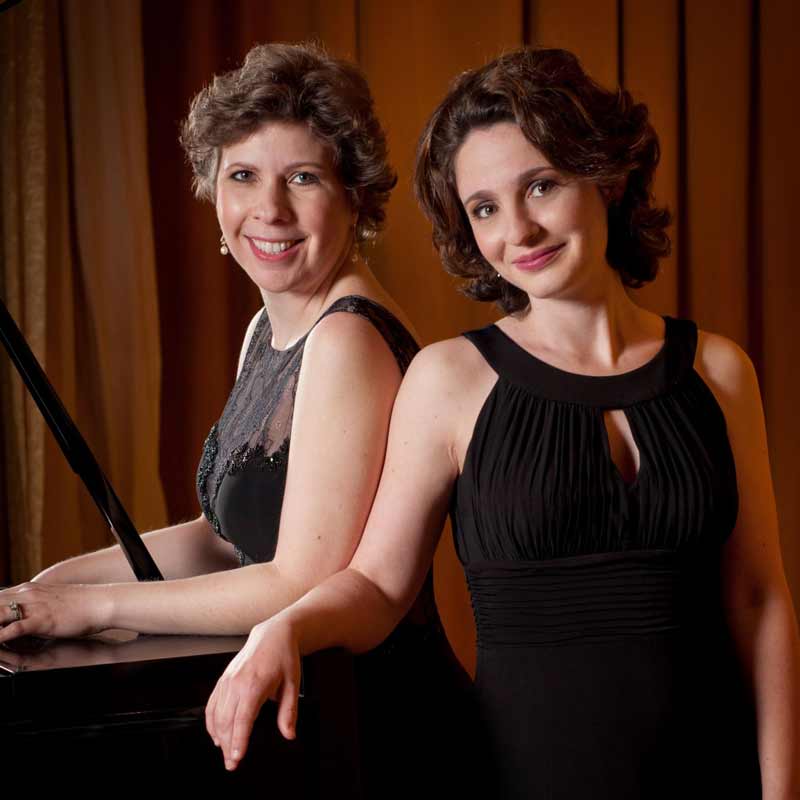Varshavski-Shapiro Piano Duo | Saturday, October 14, 2023 · 3:00pm | Salon Piano Series | Masterclass in Madison, WI

Photo Credit: Vanessa Briceno
Varshavski-Shapiro Piano Duo
Masterclass: Saturday, October 14, 2023 · 3:00pm
Program
Mozart - Piano Concerto in C Major K246: I. Allegro Aperto
Performed by
Rebecca Zhang,
age 12, who is in seventh grade at Kromrey Middle School and has been a student of Lana Robotewskyj for over five years. Rebecca plays violin in the school orchestra, as well as in WYSO. Aside from her love of music, Rebecca's other hobbies include tennis.
Rachmaninoff - Prelude in G minor Op. 23 #5
Performed by
Owen Auby,
a 14-year-old freshman at Monona Grove High School who started piano instruction only two and a half years ago and is a student of Jess Salek. Owen aspires to be a professional pianist, composer, and conductor. Hobbies include playing piano and viola, listening to classical and jazz music, and composing. Owen currently plays in a piano quartet in the WYSO Chamber Music Program, in the Monona Grove Jazz Ensemble and Orchestra, and is in his eighth year of singing with Madison Youth Choirs.
Khatchaturian - Sonatina III. Allegro Mosso
Performed by
Serafina Monat,
a 15-year-old sophomore at East High School. Serafina plays violin and viola in the EHS orchestra, and has been studying piano since age five with Shad Wenzlaff. She plays varsity tennis and also enjoys being a part of the EHS Track team. She finds time to read and relax with her two older sisters who also play piano. Serafina enjoys travel and has visited family in Eritrea.
Rachmaninoff - Prelude in D minor Op. 23 #3
Performed by
Atticus Coen,
16, a homeschooled junior in Sun Prairie. Atticus has taken piano lessons since kindergarten and has studied with Lana Robotewskyj for the past six years. Atticus enjoys reading, watching movies, and playing in the pit orchestra with local productions. Atticus aspires to play in pit orchestras professionally, and hopes to pursue music after high school, writing orchestral arrangements, composing, and performing.
Four Madison area piano students performed for the Varshavski-Shapiro Piano Duo:
- Rebecca Zhang
- Owen Auby
- Serafina Monat
-
Atticus Coen
1) 12 year old Rebecca performed the first movement to Mozart’s concerto, K 246. Rebecca was coached to start her trills loudly, and then back off in sound, as the speed of the trill will equally excite and extend the brilliance of the measure before the cadence. A general rule of thumb was reiterated: as you climb up the staff, crescendo. Rebecca played a nearly flawless
performance of the concerto, as was mentioned by the Piano Duo. Bravo to Rebecca!
2) 14 year old Owen has had 2.5 years of piano lessons, and this young man impressed! We heard Rachmaninoff’s infamous g minor prelude, op 23#5. Owen was directed to use his body weight for further deepening the sound of his fortes. Fortes should never sound forced. We play with our whole body, not just fingers. Transition the weight of the body into the fingers. Breathing in-between phrases with bigger physical gestures and letting the chords “ring’ will vastly improve the sound Rachmaninoff aspired to draw from his performers. Rachmaninoff is the “Bach of the 20C”. His writing is known to have many simultaneous voices and EVERY note is important. Russian music contains extreme feelings; everything must be exaggerated. Note the tenuto in his writing. They help navigate the score, connecting point A to point B in regards to the melody which is often enmeshed amongst many notes. Sing as you play and imagine other instrumentation to further enhance the story. A very fine performance by Owen! Bravo!
3) 15 year old Serafina presented us with the driving tempo and rhythms of the third movement to Khachaturian’s Sonatina. This very piece should be thought of as a modern painting. There are many colors and textures to experiment with. Fast playing need not be loud….the brilliance in the tempo creates as much excitement as does a forte. Slow practice is key to accuracy, and allows experimentation with articulation. Less pedal is more. Slurs and sequences abound and a suggestion was made again, that as notes ascend, crescendo. Exaggerate downbeats to realize a shift in time signatures. By accenting downbeats, time signature shifts are highlighted. Lastly, composers don’t always reveal all details and dynamics; it’s up to us to ascertain the direction of the melody. Even though chords are vertical, we can use our voice to help bring a horizontal line amongst the vertical harmonies. Thank-you Serafina for playing, and introducing us to the personality of Khachaturian! Well done!
4) 16 year old Atticus played a lesser known prelude by Rachmaninoff; d minor op 23#3. This highly introverted piece was compared to Bach as well; many voices with polyphonic writing. The Duo talked of differences between Accents and Tenuto. Anyone who studies Rachmaninoff knows his wide and vast use of tenuto to help traverse the black sea of notes. Tenuto are slower and more deliberate. Accents are sharper and quicker. The analogy of a conductor was used as a visual to “show” the difference between the two and how they should physically, be handled. A 2 note slur is to be heard as a sigh…sing with it to help sound the sigh. The Duo pointed out Atticus was ready to perform that day. Brilliant performance Atticus!
Congratulations to all participants and a huge thank-you to their teachers! An additional thank you to the Varshavski-Shapiro Duo for their wisdom, talents, and fine teaching skills. A final THANK-YOU to the Salon Piano Series for hosting such wonderful opportunities to our youth!
